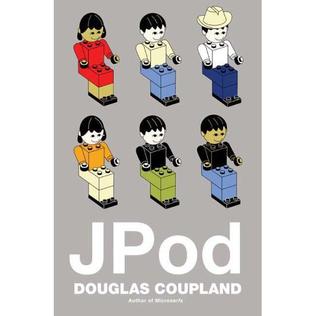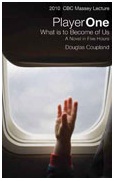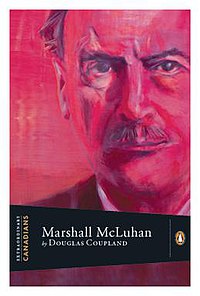
Microserfs, published by HarperCollins in 1995, is an epistolary novel by Douglas Coupland. It first appeared in short story form as the cover article for the January 1994 issue of Wired magazine and was subsequently expanded to full novel length. Set in the early 1990s, it captures the state of the technology industry before Windows 95, and anticipates the dot-com bubble of the late 1990s.

Herbert Marshall McLuhan was a Canadian philosopher whose work is among the cornerstones of the study of media theory. He studied at the University of Manitoba and the University of Cambridge. He began his teaching career as a professor of English at several universities in the United States and Canada before moving to the University of Toronto in 1946, where he remained for the rest of his life.

Harold Adams Innis was a Canadian professor of political economy at the University of Toronto and the author of seminal works on media, communication theory, and Canadian economic history. He helped develop the staples thesis, which holds that Canada's culture, political history, and economy have been decisively influenced by the exploitation and export of a series of "staples" such as fur, fish, lumber, wheat, mined metals, and coal. The staple thesis dominated economic history in Canada from the 1930s to 1960s, and continues to be a fundamental part of the Canadian political economic tradition.
Media ecology theory is the study of media, technology, and communication and how they affect human environments. The theoretical concepts were proposed by Marshall McLuhan in 1964, while the term media ecology was first formally introduced by Neil Postman in 1968.

Donna Leanne Williams, also known by her married name Donna Leanne Samuel, was an Australian writer, artist, singer-songwriter, screenwriter, and sculptor.

The Gutenberg Galaxy: The Making of Typographic Man is a 1962 book by Marshall McLuhan, in which the author analyzes the effects of mass media, especially the printing press, on European culture and human consciousness. It popularized the term global village, which refers to the idea that mass communication allows a village-like mindset to apply to the entire world; and Gutenberg Galaxy, which we may regard today to refer to the accumulated body of recorded works of human art and knowledge, especially books.

Neurodiversity, or ND, refers to variations in the human brain and cognition, for instance in sociability, learning, attention, mood and other mental functions. It was coined in 1998 by sociologist Judy Singer, who helped popularize the concept along with journalist Harvey Blume, and situates human cognitive variation in the context of biodiversity and the politics of minority groups. This view arose out of the autism rights movement, as a challenge to prevailing views that certain things currently classified as neurodevelopmental disorders are inherently pathological. It builds on the social model of disability, in which disability arises out of societal barriers interacting with individual differences, rather than people being disabled simply as a result of having impairments. Some neurodiversity advocates and researchers, notably Judy Singer and Patrick Dwyer, argue that the neurodiversity paradigm is the middle ground between strong medical model and strong social model. The subsequent neurodiversity paradigm has been controversial among disability advocates, with opponents arguing it risks downplaying the suffering associated with some disabilities, and calls for the acceptance of things some would wish to see treated. Autistic self-advocate and researcher Ari Ne'eman, one of the major advocates in the neurodiversity movement, suggested a trait-based approach, meaning that elements of the medical model can be applied in treating certain traits, behaviors, or conditions that are intrinsically harmful, whereas neurodiversity approaches can be applied to non-harmful or adaptive autistic traits of the same individual. Furthermore, in recent years, there have been developments of neurodiversity-affirming interventions and reforms of some interventions.

The autism rights movement, also known as the autistic acceptance movement, is a social movement within the context of disability rights that emphasizes a neurodiversity paradigm, viewing the autism spectrum as a result of natural variations in the human brain rather than as a disease to be cured. The movement advocates for several goals, including greater acceptance of autistic traits and behaviors; services that focus on improving quality of life and well-being rather than on suppression and masking of autistic traits, or imitations of the behaviors of neurotypical (non-autistic) peers ; and the recognition of the autistic community as a minority group.

JPod is a novel by Douglas Coupland published by Random House of Canada in 2006. Set in 2005, the book explores the strange and unconventional everyday life of the main character, Ethan Jarlewski, and his team of video game programmers whose last names all begin with the letter 'J'.

Like Colour To The Blind (1996) is the third in a series of four autobiographical works by internationally bestselling autistic author Donna Williams. Once published in the US using the American spelling 'color', it is now published worldwide by Jessica Kingsley Publishers using the UK spelling 'colour'. It has been published in several languages worldwide.
Global village describes the phenomenon of the entire world becoming more interconnected as the result of the propagation of media technologies throughout the world. The term was coined by Canadian media theorist Marshall McLuhan in his books The Gutenberg Galaxy: The Making of Typographic Man (1962) and Understanding Media (1964). Literary scholar Sue-Im Lee describes how the term global village has come to designate “the dominant term for expressing a global coexistence altered by transnational commerce, migration, and culture”. Economic journalist Thomas Friedman's definition of the global village as a world “tied together into a single globalized marketplace and village” is another contemporary understanding of the term.
This is a bibliography of Marshall McLuhan's works.

Douglas Coupland is a Canadian novelist, designer, and visual artist. His first novel, the 1991 international bestseller Generation X: Tales for an Accelerated Culture, popularized the terms Generation X and McJob. He has published thirteen novels, two collections of short stories, seven non-fiction books, and a number of dramatic works and screenplays for film and television. He is a columnist for the Financial Times and a frequent contributor to The New York Times, e-flux journal, Dis, and Vice. His art exhibits include Everywhere Is Anywhere Is Anything Is Everything which was exhibited at the Vancouver Art Gallery, and the Royal Ontario Museum and the Museum of Contemporary Canadian Art, and Bit Rot at Rotterdam's Witte de With Center for Contemporary Art and the Villa Stuck.
The Toronto School is a school of thought in communication theory and literary criticism, the principles of which were developed chiefly by scholars at the University of Toronto. It is characterized by exploration of Ancient Greek literature and the theoretical view that communication systems create psychological and social states. The school originated from the works of Eric A. Havelock and Harold Innis in the 1930s, and grew to prominence with the contributions of Edmund Snow Carpenter, Northrop Frye and Marshall McLuhan.

Douglas Mark Rushkoff is an American media theorist, writer, columnist, lecturer, graphic novelist, and documentarian. He is best known for his association with the early cyberpunk culture and his advocacy of open source solutions to social problems.

The autism spectrum is a range of neurodevelopmental conditions generally characterized by difficulties in social interactions and communication, repetitive behaviors, intense interests, and unusual responses to sensory stimuli. It is commonly referred to as autism or, in the context of a professional diagnosis, as autism spectrum disorder (ASD), but the latter term remains controversial among neurodiversity advocates, neurodiversity researchers, and many autistic people due to the use of the word disorder and due to questions about its utility outside of diagnostic contexts.

Player One: What Is to Become of Us is a novel written by Douglas Coupland for the 2010 Massey Lectures. Each of the book's five chapters was delivered as a one-hour lecture in a different Canadian city: Vancouver on October 12, Regina on October 14, Charlottetown on October 19, Ottawa on October 25 and ending in Toronto on October 29. The lectures were broadcast on CBC Radio One's Ideas, November 8–12. The book was published by House of Anansi Press.
Autism-friendly means being aware of social engagement and environmental factors affecting people on the autism spectrum, with modifications to communication methods and physical space to better suit individual's unique and special needs.
Gunilla Gerland is a Swedish author and lecturer on the topic of autism.

The Autistic Brain: Thinking Across the Spectrum is a 2013 nonfiction popular science book written by Temple Grandin and Richard Panek and published by Houghton Mifflin Harcourt. It discusses the subject of Grandin's life experiences as a person with autism in the early days of scientific research on the topic and how advances in technology have revolutionized the understanding of autism and its connection to the brain.














